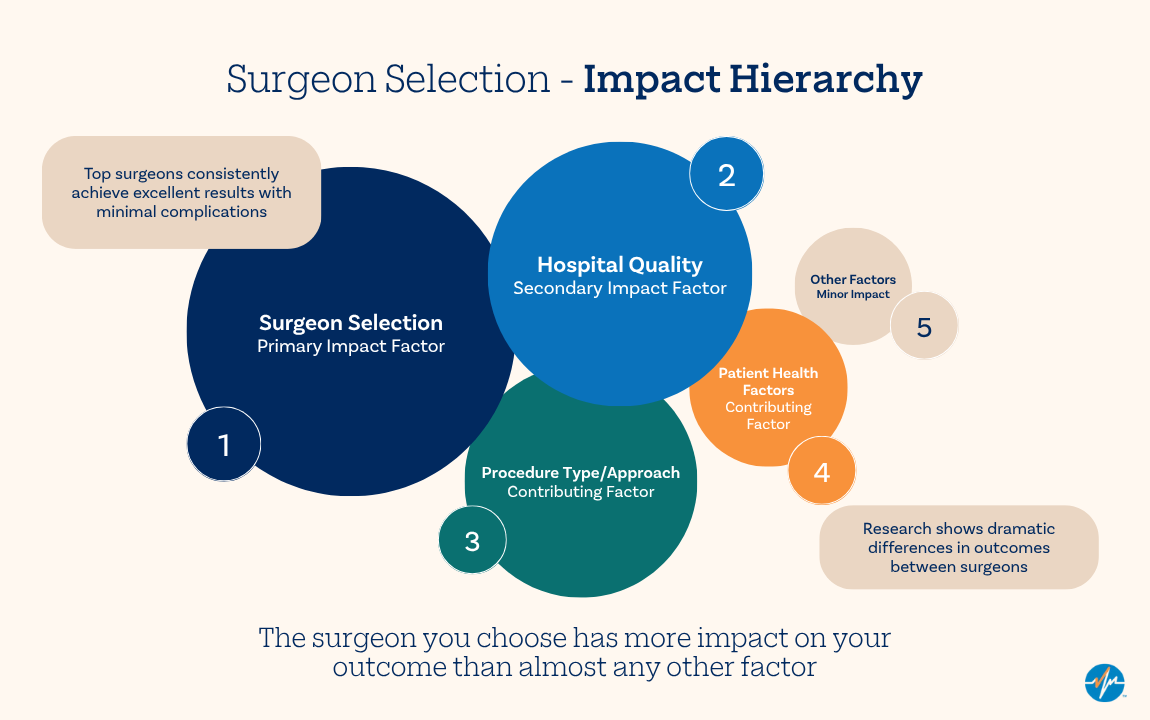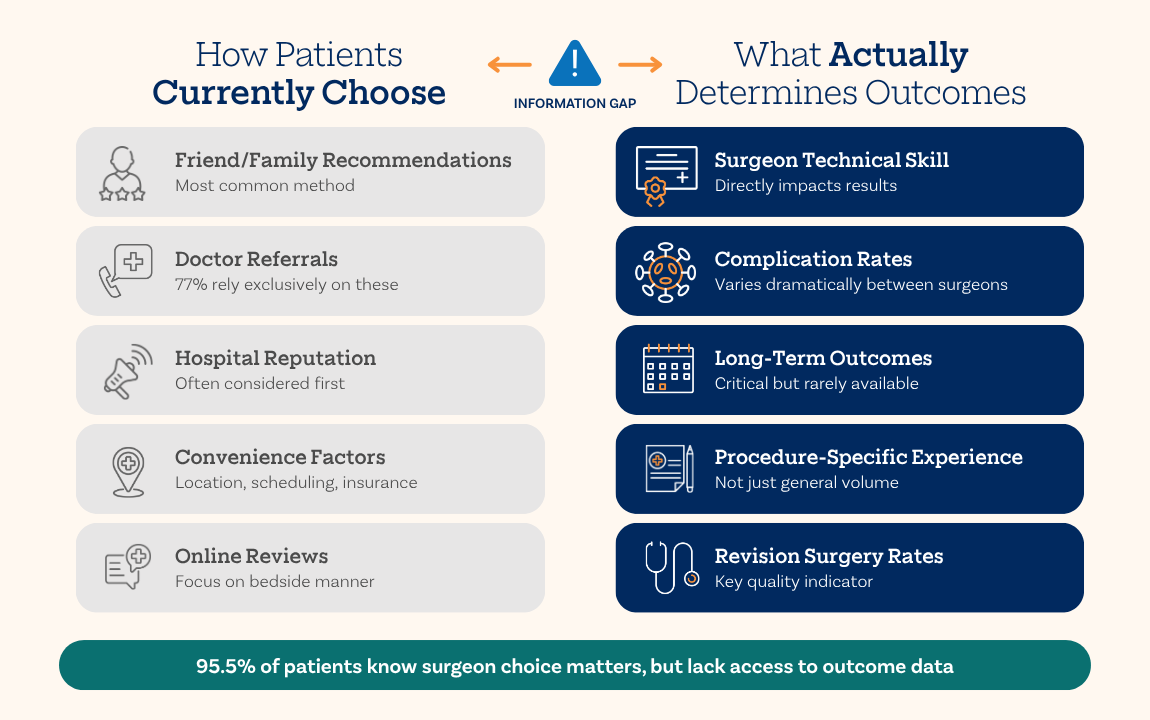When you need surgery, you probably spend more time researching your next car purchase than choosing your surgeon.
Most patients rely on a friend’s recommendation, their doctor’s referral, or simply go with whoever their insurance covers.
But here’s what might surprise you: your choice of surgeon has a greater impact on your surgical outcome than almost any other factor.

The Hidden Truth About Surgeon Performance
While all surgeons have medical degrees and completed residencies, their actual performance varies dramatically, much more than most patients realize.
Think of it this way: even among Olympic athletes who’ve all reached an elite level, performance differences are obvious. Some consistently win while others struggle. The same is true for surgeons.
Some surgeons consistently achieve excellent results with minimal complications, while others performing identical operations see patients return with infections, need additional surgeries, or experience prolonged recoveries. Two surgeons working in the same hospital, with similar training, can have vastly different track records.
The surgeon you choose isn’t just performing your operation—they’re the single biggest factor determining whether you’ll have a smooth recovery or face serious complications.
What Patients Don’t Know
Despite surgeon selection being critical to outcomes, most patients are making this life-changing decision based on limited, often irrelevant information.
Research shows that patients typically choose surgeons based on:
- Word-of-mouth recommendations from friends and family
- Primary care physician referrals
- Hospital reputation rather than surgeon-specific performance
- Convenience factors like location and appointment availability
- Subjective reviews focusing on bedside manner rather than surgical skill
Here’s the problem: 95.5% of patients believe surgeon selection is crucial to their outcome², yet their selection methods don’t align with what actually determines surgical success.
The Information Gap That’s Putting Patients at Risk
When you choose a restaurant, you can easily find reviews, ratings, and detailed information about food quality.
But when choosing a surgeon for a procedure that could change your life, you’re essentially flying blind.

A landmark analysis by ProPublica examining surgeon performance found “stunning variation in complication rates among surgeons” and discovered that “even within ‘good’ hospitals, performance between surgeons can vary significantly.”³ Yet this critical performance data remains largely hidden from patients.
Consider these sobering statistics:
- Nearly 1 in 6 of the 300 million surgical procedures performed annually involve complications⁴
- Much of this variation stems from inconsistent surgical practices and the lack of data-driven surgeon selection
- Patients have no way to access the objective performance data that could help them avoid high-risk surgeons
Why Current Selection Methods Fall Short
Primary care referrals, while well-intentioned, often aren’t based on outcomes data. Your family doctor may recommend a surgeon based on personal relationships, hospital affiliations, or simply because they’re “in-network”—not because they have the best track record for your specific procedure.
Online reviews and ratings tell you about office cleanliness, wait times, and staff friendliness—but nothing about the surgeon’s complication rates, infection rates, or long-term patient outcomes. A surgeon with a stellar bedside manner might have a complication rate three times higher than a less personable colleague.
Hospital reputation matters, but research shows significant variation between surgeons even within the same prestigious institution. Choosing a “good hospital” doesn’t guarantee you’ll get a top-performing surgeon.
What This Means for You
The next time you or a loved one needs surgery, remember that surgeon selection has a greater impact on your outcome than almost any other factor. While you can’t control your underlying health conditions or the complexity of your procedure, you absolutely can control which surgeon operates on you.
The variation in surgeon performance isn’t small—it’s dramatic. Choosing a top-performing surgeon versus an average one could mean the difference between a smooth recovery and serious complications, between getting back to your normal activities quickly and facing additional surgeries.
Taking Control of Your Surgical Decision
Your surgery is one of the most important healthcare decisions you’ll ever make. You deserve access to objective, data-driven information about surgeon performance, not just subjective opinions or convenience factors.
Ready to discover what to look for in a surgeon? Learn how to find surgeons with proven track records of excellence and the specific questions you should ask before scheduling your procedure.
References
- A Systematic Review of the Factors that Patients Use to Choose their Surgeon – PubMed – https://pubmed.ncbi.nlm.nih.gov/26362880/
- Factors considered by patients in provider selection for elective specialty surgery – ScienceDirect – https://www.sciencedirect.com/science/article/pii/S1743919119301591
- ProPublica Surgeon Scorecard analysis of Medicare data – https://projects.propublica.org/surgeons/
- International Surgical Outcomes Study (ISOS) group. Global patient outcomes after elective surgery: prospective cohort study in 27 low-, middle- and high-income countries. Br J Anaesth. 2016;117(5):601-609. https://pubmed.ncbi.nlm.nih.gov/27799174/


